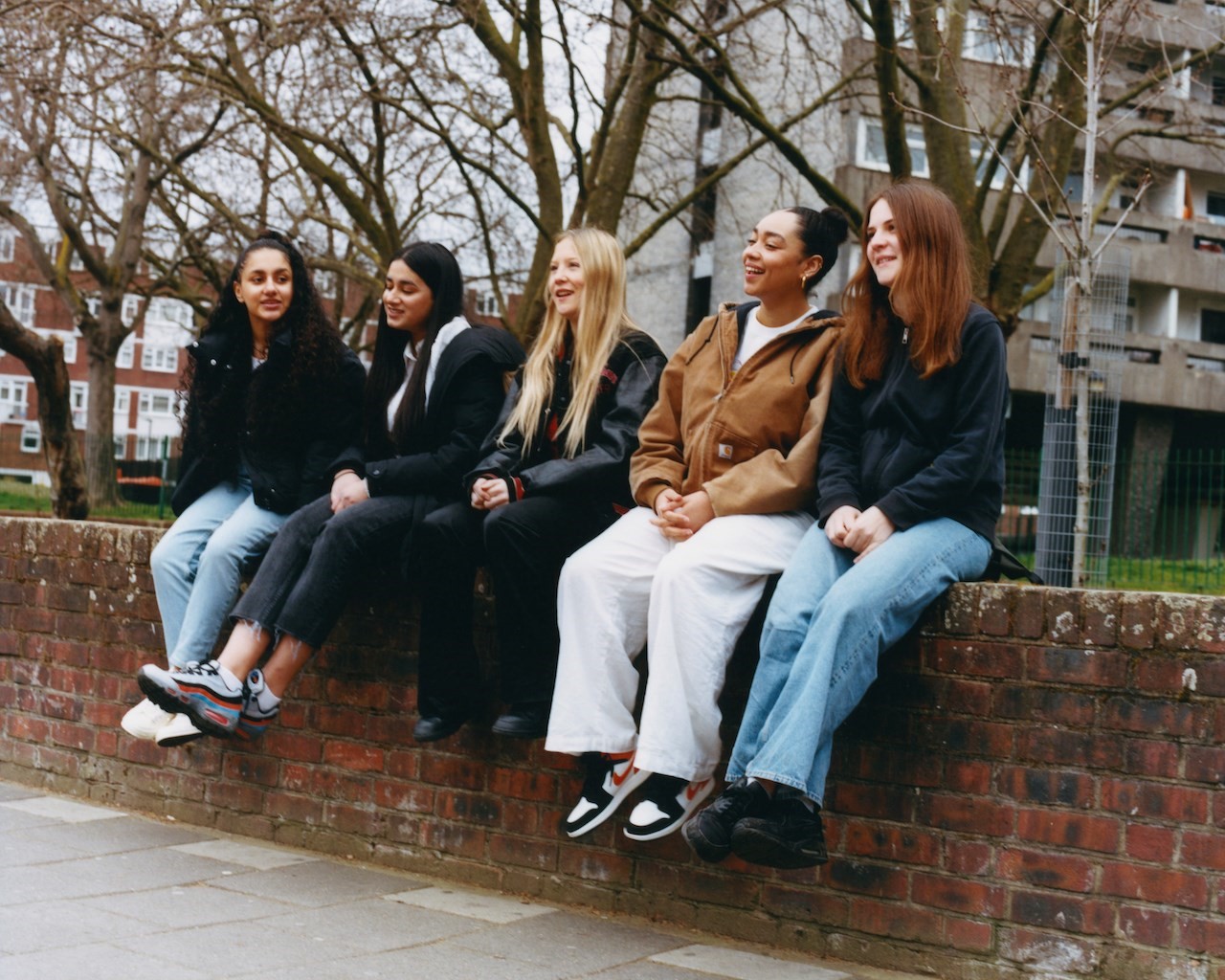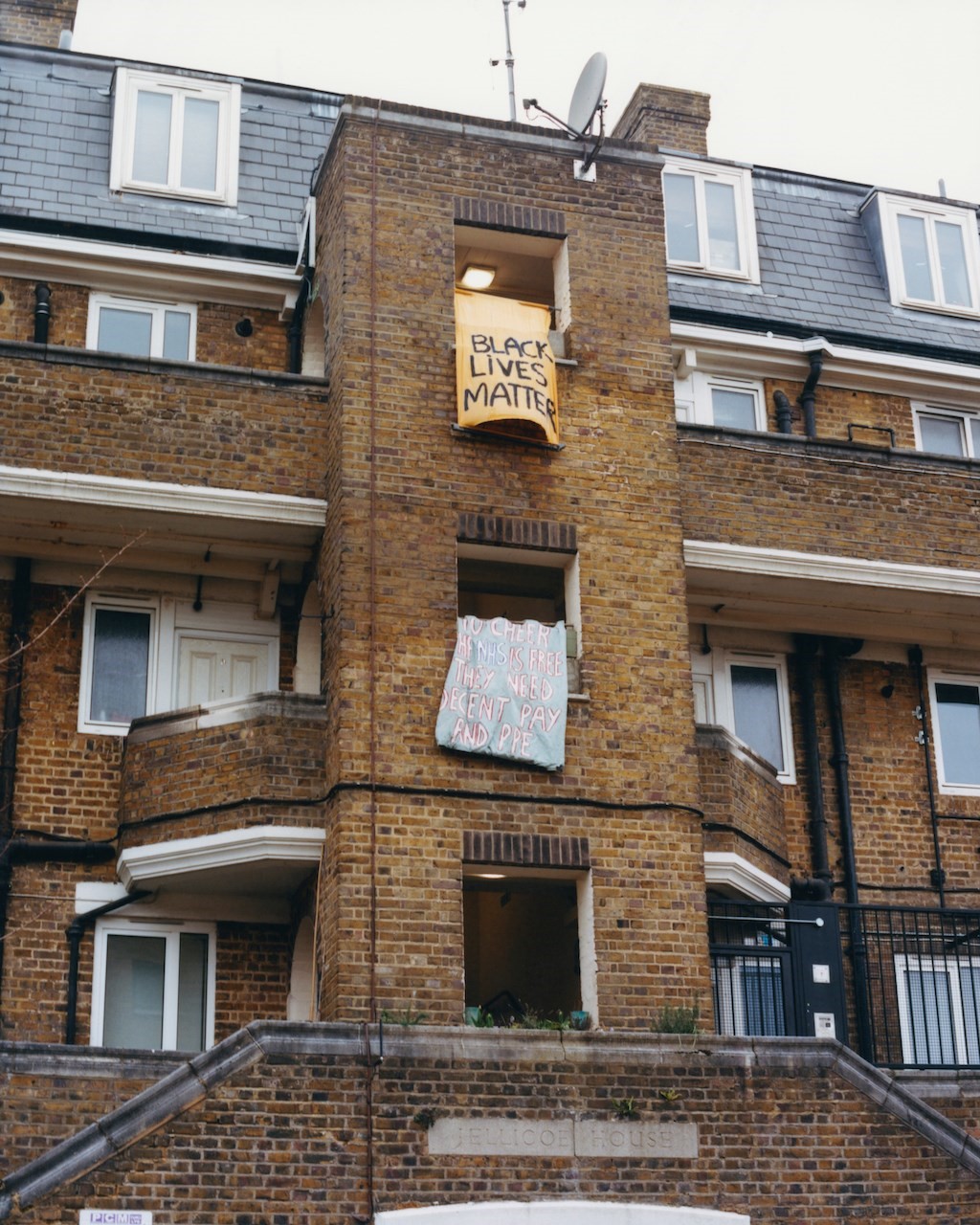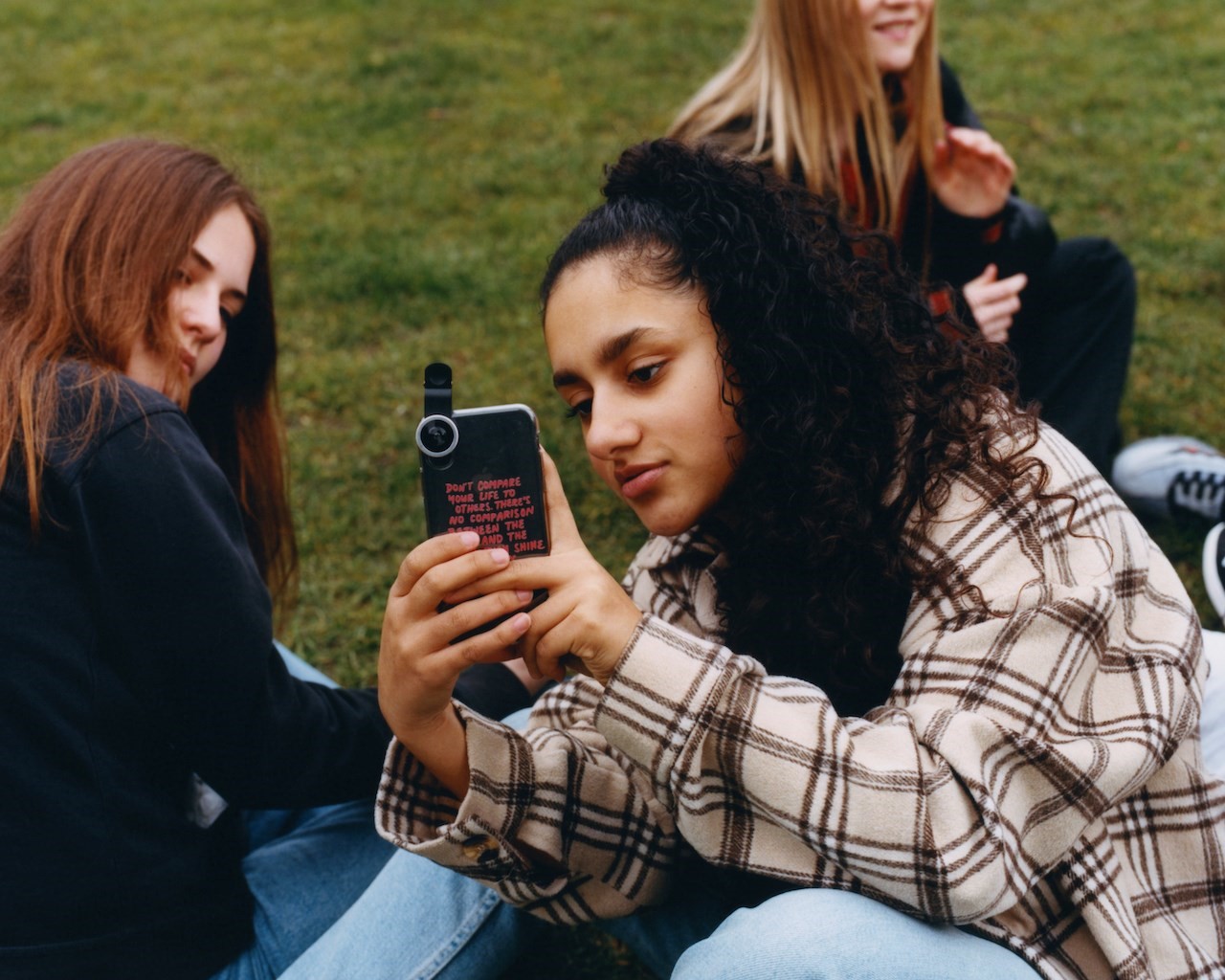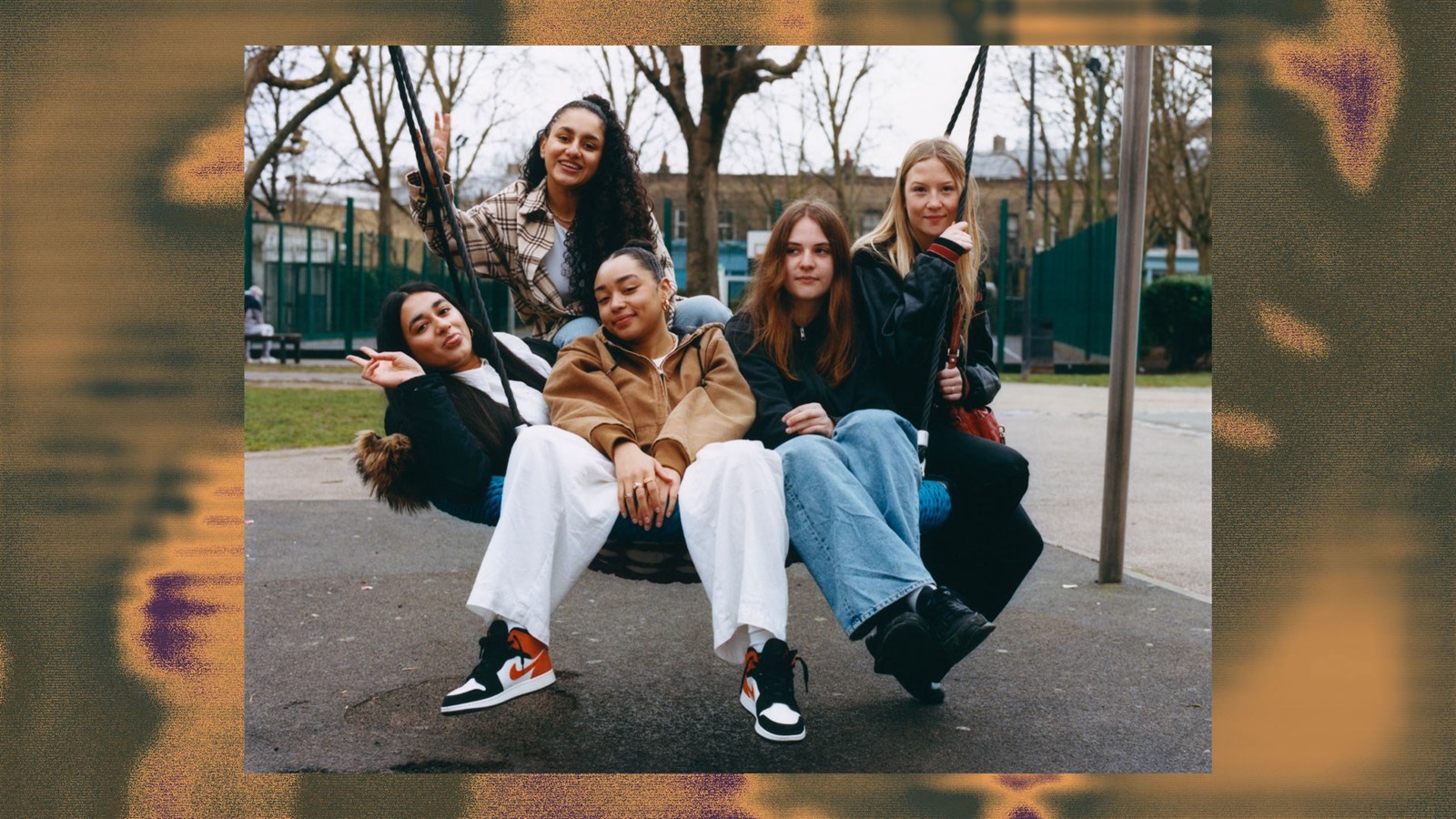Five Londoners on the cusp of adulthood come together to talk gentrification, pollution and the future of navigating the city as a young woman
Welcome to A Future World – Dazed’s network, community, and platform focusing on the intersection of science, technology and pop culture. Throughout April, we’re featuring conversations and mission statements from the people paving new pathways for our planet: activists, inventors, fashion pioneers, technologists, AI scientists, and global youth movements, alongside in-depth editorial exploring the new realities for our future world.
In London, it can often feel like you’re being held emotionally hostage by the city. We say that we love it, and yet it doesn’t love us back. When I began to write this, my best friend Leila, a lifelong West London resident, WhatsApped me a familiar refrain: “I’m seriously looking at commuter towns to London. Everything is just so fucking expensive here.” Both of us know she won’t be going anywhere anytime soon, our emotional ties to home being too magnetic. Even when we think of leaving to find greener and cheaper pastures, we think of those places only in terms of their proximity and resemblance to London, their infrastructure, transport, and fun.
Still, for others, it appears the process of an exodus is beginning. The population of London is forecast to decline for the first time since 1988, according to reports by accountancy firm PwC who have suggested that the capital could see 300,000 fewer people recording it as their home (the recent census, completed in March, might do a lot to show us if that’s really the case). A boom in homeworking, and the pandemic’s suspension of Central London’s bustling hecticness, has made many rethink their way of living and whether the atomisation of city life is something they even want for themselves.
For those who won’t or can’t abandon the city, there’s anxiety about what the post-Covid landscape of London will feel like – particularly as we pause and begin to wonder whether this city we’ve acclimatised to was ever really habitable in the first place. Headlines have focused on the movement of workers post-Brexit and post-COVID, with the Financial Times projecting London’s fight for the future lying in the movement of bankers fleeing Brexit Britain for EU countries (though this has been delayed by the pandemic travel restrictions, and remote working reducing the need to relocate to take on international jobs). Elsewhere, the post-Brexit foreign policy impact on the social makeup and housing landscape of the city is being speculated about, following the UK’s announcement of routes for Hong Kong residents with British National (Overseas) status to live, study and work in Britain and apply for citizenship. Reuters writes about some Hong Kong residents purchasing houses and apartments in and just outside the capital to lease for income in Britain. The real estate landscape of London might be about to become even more casino-like.
“The real estate landscape of London might be about to become even more casino-like”
But amongst these quite boring financial and political considerations, the concerns and priorities of young, urban city dwellers are absent from headlines. Those who have grown up in London among all the city’s transformations and who now, on the cusp of adulthood, are forced to reckon with the reality that the future they imagined for themselves in this city may have been mere dreamwork. With their streets and homes being surveyed for how they might best serve the interests of financial workers and the super-rich, the everyday rituals and aspirations of youth who are tied to London are marginalised, and youth feel more and more alienated from the place they call home. As part of A Future World, we sought to rival this by speaking to 5 London teenage girls and exploring the future of city-living through their eyes, their dreams, and their anxieties. The same week I spoke to these girls, the conversation about how young women traverse cities safely was thrown into a different public light in the wake of Sarah Everard’s murder; a tragedy that inevitably colours the girls’ perspectives on a future that feels safe and secure in London.
GENTRIFICATION
SOPHIE: I live in Islington but I went to school in Hackney. Literally in the 5 years that I went to that school I noticed a dramatic change, especially because I had older siblings that went there. Compared to my brother, who’s 23, my experience of the area is just so different. Even just little things like the 5 years that I went to the main high street, just little pop ups like the coffee shop. Buying lunch got more and more expensive. Things like that.
ALIYAH: What Sophie said really made me think of the conversations you have with your family and your parents – like, when you get to be an adult it’s actually going to be a lot harder for you to try and find property in London. And that’s quite scary because I’ve grown and lived in London all my life and to think that just because of that process, I will be pushed out, it’s really daunting. And also the conversation around uni. Like I’ve applied for one uni in London but that is probably at the bottom of my list due to how much it just costs to live in London. Despite me not having to pay for accommodation, just lunch, travelling, that sort of stuff, is super, super expensive. So yeah it’s just pretty scary and for me, where I live in Newham, I’m always getting on public transport. Literally the other day I got out of my local station and I was like ‘what on earth, why is there a Starbucks near me?’. Like it sounds so silly but (in) that area no one ever associates it to be like that, and it’s a really grand, nice-looking Starbucks, and I’m like ‘What are they doing?’ Even on the train, people were just saying completely negative things about the area, and saying ‘oh, it’s changed so much’. So people are witnessing change and it’s happening really fast, I can’t keep up to be honest.
“Literally the other day I got out of my local station and I was like ‘what on earth, why is there a Starbucks near me?’” – Aliyah
PRECIOUS: I’ve lived here my whole entire life, I can’t imagine living anywhere else – other than a sunny country, because I like a holiday vibe. But I can’t imagine having kids anywhere other than London because my upbringing was just so cool – Shoreditch is just around the corner, I can go into the city. It’s something I would’ve loved to have for my future but it just seems like with the prices of everything around here it’s not gonna happen. And it’s quite heartbreaking to be honest… you just wanna be in your area for life.
SARAH: And the housing crisis is ridiculous and crazy. I love Hackney, I love London, I’m born and raised here. (But) a lot of the people I talk to, all of my friends, everyone’s scared. Where are we gonna live? How are we gonna afford it? You have to work 10x harder to get the highest paying job to be able to live here. So it’s constant little fears about your life, not just ‘I need to get a job, I need to finish my education’ – because, where am I gonna live?
LAURA: I’ve never thought about gentrification as it links to lockdown, but for my Geography course I did a case study on the gentrification along Chatsworth Road and there was loads about the exclusion, and how people are worried with house prices rising (that) they’re not going to be able to live there anymore. (They said) how they feel like strangers walking around their area.

HOUSING
SOPHIE: Personally, I think I’ll try and live at my parents as much as possible. My brother’s 23 and he still lives with us, he’s working from home. I think it’s just about saving the pennies so you can reduce the amount of years you waste money on a crazy amount of rent. I think that’s a lot of people’s plans.
PRECIOUS: I’m planning on staying home as long as my mum will keep me, because it’s not that easy. My sister’s just left, she’s 25, and she actually moved out of London so it seems to be the way that it’s gonna go – stay at home as long as I can, and go to where I can afford. And it seems a lot of people did that during lockdown, just moved. I know a lot of people on my street who moved, and I think they moved outside of London because they realised London is a bit too much.
ALIYAH: With lockdown, everything’s online, so technically we’re much more connected that I don’t think people are necessarily thinking about having to stay in London. That pressure isn’t necessarily there.
LAURA: I literally moved out from Hackney to Leytonstone just two days ago! My parents didn’t like the gentrification and how ‘hippy’ it’s becoming. I can’t really say I wanted to stay in Hackney, but I don’t want to move out of London. My parents just didn’t feel like it was the same area that they moved into.
SARAH: Realistically I probably will be staying in London with my parents, but I would love to move away. I’d love to move to a country like Australia and just start afresh somewhere else. Of course I love London, it’s where we grew up, but I’m ready for a new start. Like Laura said, you can’t really recognise where we grew up in Hackney.
“My parents didn’t like the gentrification and how ‘hippy’ it’s becoming... My parents just didn’t feel like it was the same area that they moved into.” – Laura
POLLUTION
ALIYAH: I don’t think enough young people realise (about pollution). I feel like I do because I’m always going to my Dad’s, because he doesn’t live in London, and when we go on walks I’m like ‘Oh my God, the fresh air here!’ I always make jokes about not being able to breathe properly in London because you don’t notice the difference until you’re out of it. Even little things like your face mask at the end of the day, how disgusting it is. I feel like stories like Ella Kissi-Debrah (nine-year-old from South London whose cause of death was air pollution in 2013) emphasises how important it is. I feel like young people will say ‘it doesn’t affect me’, or ‘I don’t notice it’, until they hear stories like that. So yeah I think it is incredibly important, it’s something we have to consider because it’s our health at the end of the day. I’m on (public) transport all the time, every single day, and I just hate it, it’s mucky, the pollution and everything, I’m not a fan.
LAURA: I’m remembering these triplets (we knew), they moved out of London to Hastings because their dad was so worried about the pollution. That was the main reason they moved, how bad it was getting.
PRECIOUS: For me, just focusing on pollution as a reason to leave London, it just had never crossed my mind. I always focus on the other environmental stuff like recycling, wondering if I’m putting stuff in the right place, using reusable things. So that’s something that’s made me think differently now, like yeah, pollution is really bad around here. Do I really want that in my lungs? I barely eat meat! Maybe pollution is gonna push our generation out.
ALIYAH: I think it’s because we can’t see it. It’s stuff that we don’t see straight away. And I think also we’re a massive problem, ordering Ubers, catching flights, we’re actively contributing towards it and we don’t notice it.
SOPHIE: Younger people might be a lot more conscious of the environment, but especially when there’s visual issues like housing and gentrification and other day to day things, the environment feels like less of a priority because it doesn’t as obviously affect our day-to-day lives. And it feels like this huge problem that we can’t do as much to solve.
“Maybe pollution is gonna push our generation out” – Precious
NIGHTLIFE
PRECIOUS: All I know is I’m ready to club. I’m 18 tomorrow! I want to go out and drink. But I will definitely be like ‘oh they’re a bit too close to me’, ‘okay they’re breathing’... but I don’t know, it’s gonna be a weird one in terms of feeling weird about being in those spaces. But I definitely think mini places will be popping up, like pop-up clubs maybe will be a thing.
ALIYAH: I feel (that), from a political perspective, the government don’t want nightlife to return. I was talking to my mum about it the other day and she was literally like ‘it’s always been a nuisance to them, they want clubs closed’. And it’s never been a priority either. Like when lockdown has been eased I’ve never seen clubs reopen fully anyway. It’s not a priority. As pessimistic as it sounds and as much as I want them to be open, I don’t feel like they’re going to prioritise it. So like Precious said I think it’s going to be a case of reinventing it, other spaces, whatever that looks like. But I’m not sure they’re going to reopen or be as sustainable as they were pre-COVID.
SARAH: I’ve really gained that awareness now of people outside and how close together we are at festivals or clubs. When I think about it I’m like ‘why are we so close to each other?’. But also I don’t think the government will open clubs until late summer, I do think it’s a nuisance to them. So I feel like it’ll be pushed back, or still restrictive.

COMMUTING
PRECIOUS: The commuter life, I’m not here for that. I walk to school which is like 10 minutes away, and I’m happy with that. Even when I’m getting the bus to wherever I’m going, I hate it. That part of it is gonna be a pain in the ass.
SARAH: I’ve seen the train stations at 5 or 6 when people finish work and it’s so busy, rush hour, and I feel like that adds to the pollution, lots of people travelling, I’m dreading that side of it.
SOPHIE: I was in a YouTube black hole watching random videos and they said the link between our boost in productivity and our better mental health during lockdown is because we don’t commute, (commuting) is such a stress and overall (it) does not help our day. I think it’s one of those little things that you don’t think doing on the daily will affect you, but it definitely does.
LAURA: I prefer going somewhere to do work because I just don’t have any motivation at home, I just can’t do anything by myself. So I do need that – not the journey, but just the leaving my house.
ALIYAH: I went to a Sixth Form in Hackney last year and I left because the commute was part of my issue. It took me an hour and a half to travel, but by car it was like 25 minutes. So it really put me off. So now I’m going to another Sixth Form, it takes me 40 minutes, I still have to take a train but it’s a lot shorter. But at the same time there’s an aspect of it that I like, the hustle and the bustle, but it does still put me off. I’d like the balance of being able to do things at home, even though we’re all experiencing Zoom fatigue. I do like human interaction, I’d like (a) balance.
“I’d like the balance of being able to do things at home, even though we’re all experiencing Zoom fatigue. I do like human interaction, I’d like (a) balance.” – Aliyah
TRANSPORT
PRECIOUS: Cycling in London is my biggest fear right now. I’m scared to ride a bike because of trucks and lorries. And with all these restricted roads you can’t get anywhere now, a trip that took 5 minutes because there was a back road now takes an hour because you need to take the main roads. So driving isn’t gonna work, cycling I need to get over my fear... it seems like train and bus life for me!
SARAH: With cars, I feel like expenses add to it. You have to pay so much firstly to buy your car, road tax, insurance, MOT, congestion charge. There’s just so much. In Hackney recently they added all these road blocks so you can’t even take shortcuts to get to places. So I feel like there’s no point in driving and wasting all that money. Cycling is so scary because I feel like, God forbid, I will get run over.
LAURA: I get the train to school, it’s not that long. I wouldn’t cycle or drive, but still with trains, it’s better during lockdown when the trains are less busy. Usually when you’re getting the trains to school it’s so bad, just so busy.
SOPHIE: In lockdown I’ve really gotten into walking. It sounds really boring, but it’s great for your mental health. So I’ve got this idea that I might start walking back from school, or to. But there is something so hectic about running for the bus, quickly grabbing your mask in that time, especially in winter when you’re wearing a coat, run, and then you’re sweaty. But it’s one of those things where when I’m back in the hustle and bustle of life it might just not happen.
“As a girl, after lockdown, I’m gonna miss my personal space not being invaded by weird men. I think a lot of girls are gonna miss that. It’s sad that it’s taken a pandemic for that to happen” – Sophie
WHAT WOULD YOU KEEP ABOUT LOCKDOWN?
PRECIOUS: Masks. Definitely. Being protected against people sneezing and talking. Even just the cold, I like the masks. They’re comfy!
ALIYAH: Social distance, maybe. I know it sounds harsh but on trains but when I’ve got someone’s armpit in my face, it’s not a vibe. And maybe elements of being connected online, as much as people are sick of it, the fact you don’t have to travel between meetings is helpful. So some of that I hope will stay.
SOPHIE: I think, as a girl, I’m gonna miss my personal space not being invaded by weird men. And I think a lot of girls are gonna miss that. That’s the one benefit of lockdown, it’s sad that it’s taken a pandemic for that to happen.
SARAH: Just having more time to ourselves at home. A lot of us have got to know ourselves better at home, which we don’t do because we’re always so busy, with London life.
Casting, Precious Greham Johnson









